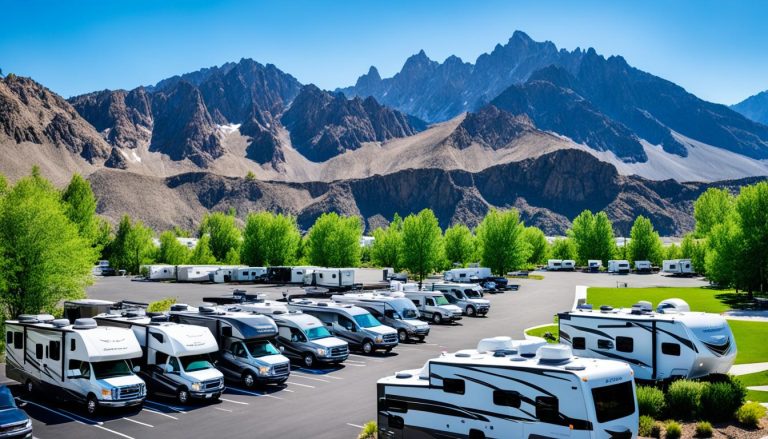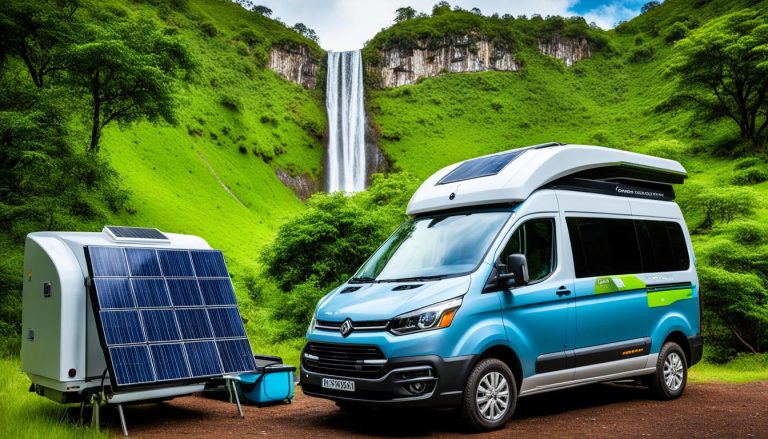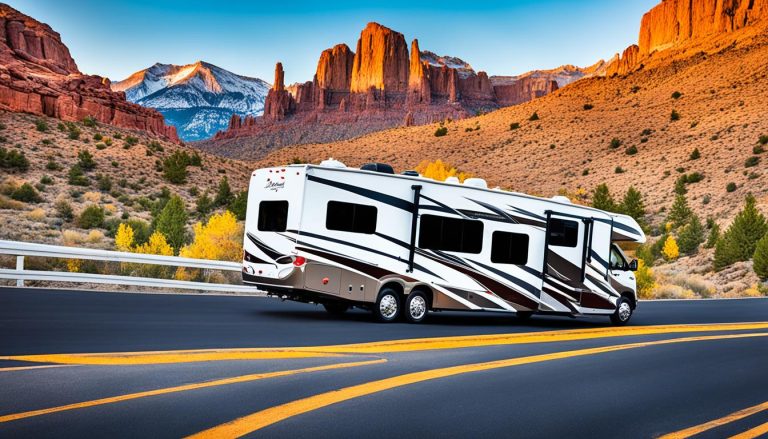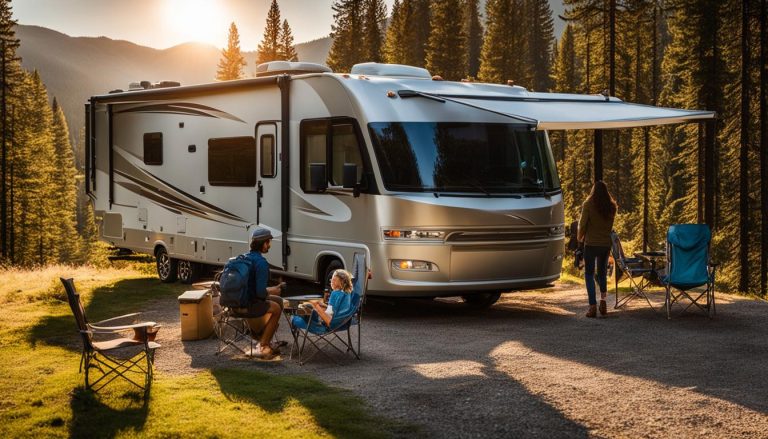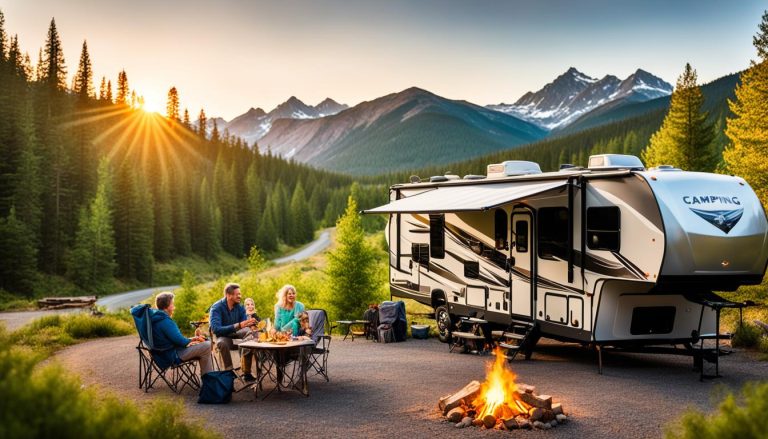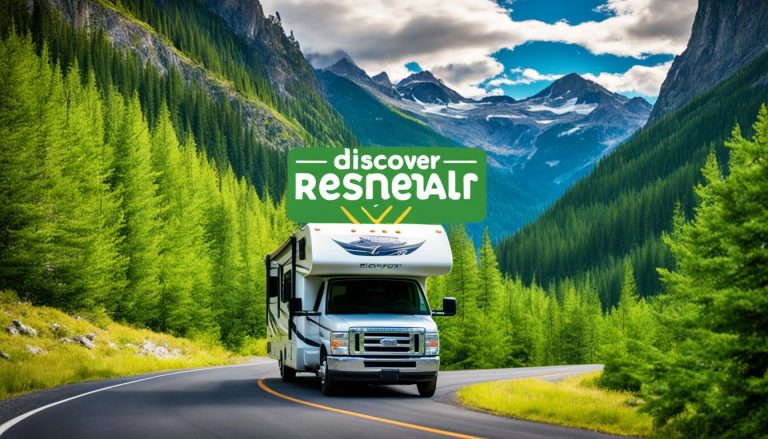Uncovering Hidden Costs of Renting an RV
gorvlifestyle.com and its partners may earn a commission if you purchase a product through one of our links
The allure of traversing the countryside in a home-on-wheels has many adventurers turning to RV rentals for their next vacation. While the upfront rental cost might seem all-encompassing, several potential hidden costs of renting an RV are often overlooked, turning an estimated budget on its head. From mileage overages to post-rental cleanup, RV rental additional fees can accumulate swiftly, leaving renters with a whiff of sticker shock upon their return. Awareness of these unforeseen expenses in RV rental is key to planning a financially savvy trip on the open road.
Companies like RVshare have streamlined the rental process but caution renters to deliberate on post-travel expenditures. These can vary greatly based on journey specifics and the vehicle’s condition upon return. Transparent communication about potential additional fees is essential, as administrative charges may also come into play, potentially increasing the overall expense. The joy of RV travel doesn’t have to be dampened by unexpected costs; with the right knowledge and meticulous planning, the open road is yours to explore without financial surprises.
Key Takeaways
- Beware of the fine print to fully grasp the potential hidden costs of renting an RV.
- Consider post-travel fees such as cleaning charges and administrative fees when budgeting for your trip.
- Ascertain any limits on mileage and what overages could apply to the rental contract.
- Factor in RV rental additional fees for amenities and insurance to avoid unexpected costs.
- Strategize and prepare a comprehensive budget that accommodates all foreseeable expenses.
- Maintain open lines of communication with the rental agency or owner to clarify any potential unforeseen expenses in RV rental.
Introduction to the Rising Popularity of RV Rentals
The landscape of travel has shifted in recent years, with a noticeable pivot towards the independence and flexibility offered by RV rentals. As the appeal of traditional air travel and hotel stays has waned—perhaps influenced by a desire for more self-contained travel options—many adventurers have turned to the home-on-wheels lifestyle that only RVs can provide. A surge in the popularity of RV vacations can be attributed to the unique combination of comfort, flexibility, and the opportunity to intimately engage with the nation’s vast and varied scenery.
RV rentals have emerged as a favored option for all types of travelers, from those taking their first trip to well-versed road wanderers. This trend has brought with it a critical need for careful budgeting for RV rental expenses. While RVing allows for a custom-tailored travel experience, potential renters are faced with navigating a complex market. Platforms like RVshare offer diverse options, akin to the Airbnb model for RVs, thereby expanding the traditional notion of vehicle rental.
However, the cost of renting an RV involves more than just the daily rate. Each choice comes bundled with considerations like the rental’s duration, the distance planned for travel, and various other RV booking hidden charges that can sneak up on the unprepared renter. Hence, comparing different rental options—whether through an individual owner or a company—and closely examining the fine print of pricing and policies is imperative to avoid any financial surprises along the road. Below is a summary of key aspects to consider during the RV rental process.
| Aspect | Description | Notes for Renters |
|---|---|---|
| Base Rental Rate | Daily or weekly rate for the RV itself | Often the starting point for cost estimation |
| Mileage Fees | Charges per mile beyond an allotted distance | Can be a major cost depending on trip length |
| Insurance | Coverage for potential damages or incidents | Crucial for protecting your trip investment |
| Equipment Rentals | Additional gear like generators or kitchen kits | May be needed for comfort but add to the total cost |
| Reservation Deposits | Payment upfront to secure the rental | Typically applied to the final rental cost |
Emphasizing the importance of a transparent rental process, it’s recommended for travelers to maintain open lines of communication with rental providers. This helps in obtaining a comprehensive understanding of all the costs associated with the RV rental experience. Ultimately, a blend of careful planning, thorough research, and proactive inquiries will pave the way for a memorable and affordable adventure on wheels.
Deciphering RV Types and Their Influence on Rental Costs
Embarking on an RV adventure invigorates the spirit of travel, but it is shrewd to acknowledge how varying RV types will sway your budget. From the grandeur of Class A motorhomes to the modesty of pop-up campers, each category carries a unique rental cost breakdown that can shape your journey’s expenses.
Class A, B, and C Motorhomes
Renowned for their luxury, Class A motorhomes are the zenith of comfort on the road, with larger living spaces and amenities akin to a luxurious rolling abode, which is reflected in their higher rental price. Conversely, Class B and C motorhomes serve as the intersection of affordability and comfort, ideal for smaller traveling parties or those seeking a balance between amenities and budget-friendliness.
Towable RVs: 5th Wheels, Toy Haulers, and Popups
Compelling savings can be found within towable RV options such as the 5th wheels, toy haulers, and pop-up campers, known for their flexibility and diverse price points. These variations cater to different needs, whether additional storage for toys or a compact, easy-to-manage shelter, thus offering a customizable approach to aligning travel preferences with expenditure.
Driveable vs. Towable Cost Comparison
The perennial question for travelers is whether to opt for a driveable motorhome or a towable unit. There is a striking difference in expenses not just in rental rates, but more so when considering the unexpected RV rental expenses tied to each category. The table below illustrates the cost comparison to aid future renters in making an informed choice that suits their budget and travel style.
| RV Type | Average Rental Cost | Fuel Efficiency | Total Estimated Cost * |
|---|---|---|---|
| Class A Motorhome | $250-$400/night | 6-10 MPG | $280-$450/night + |
| Class B Motorhome | $100-$200/night | 18-25 MPG | $120-$220/night + |
| Class C Motorhome | $150-$300/night | 10-15 MPG | $175-$325/night + |
| 5th Wheel | $100-$250/night | Depends on Tow Vehicle | $130-$280/night + |
| Toy Hauler | $100-$250/night | Depends on Tow Vehicle | $130-$280/night + |
| Popup Camper | $50-$150/night | Not Applicable | $60-$160/night + |
+ Estimated costs account for the rental rate and additional expenses such as mileage and generator use. Fuel efficiency directly impacts costs, especially in the case of driveable RVs.
In essence, your choice between the storied highways in a Class A and the quaint charm of a pop-up camper can significantly alter the RV rental cost breakdown. The reality of unexpected RV rental expenses—often neglected until they surge upfront—should be paramount in decision-making for a trip that is as financially responsible as it is exhilarating.
Where to Find an RV Rental: Agencies vs. Individual Owners
When considering an RV adventure, potential renters are often faced with a choice: opt for the consistency offered by established RV rental companies such as Cruise America, or embrace the uniqueness that comes with renting from individual owners found on platforms like RVshare. This critical decision hinges on various factors including the level of experience a renter has, personal travel style preferences, and the importance placed on the overall budget.
For novices, larger rental agencies provide a sense of security through standardization. Here, one can expect a streamlined process and a fleet of RVs that offer similar layouts and operational instructions—ideal for those just getting their feet wet in the RV world. However, for those in pursuit of a more unique experience or specific amenities, individual owners present a vast spectrum of options that can cater to more tailored tastes.
One key in navigating and selecting the best choice for RV rentals is to compare and contrast what each option provides. Below, we highlight the various considerations:
| Comparison Criteria | Rental Agency (e.g., Cruise America) | Individual Owners (e.g., RVshare) |
|---|---|---|
| Model Standardization | Standardized models offering simplicity | Diverse array of unique RV models |
| User Experience | Uniform user experience, ideal for beginners | Personalized experience varies with owner |
| Pricing Structure | Inclusive, straightforward pricing with fixed terms | Flexible pricing, potential for customized deals |
| Mileage Policies | Typically have mileage limits with set fees for overages | Varies by owner, with some offering unlimited mileage |
Tips for avoiding hidden RV rental costs involve thorough research and clear communication. Regardless of which rental path is chosen, it’s critical for renters to meticulously review all the terms, inquire about any potential additional fees and negotiate terms when possible. Engaging in these practices can prevent unexpected expenses and ensure a rental experience that aligns perfectly with budgetary constraints and travel aspirations.
Renters should use this table as a starting point to evaluate their personal needs against the offerings of each rental source. By doing so, they can embark on an enriching journey, armed with the information needed to make the most informed and cost-effective decision regarding their RV rental.
Understanding RV Rental Prices and Policies
When considering an RV rental, potential adventurers are often first attracted by the prospect of freedom and flexibility. However, a clear understanding of RV rental prices and the hidden costs of renting an RV is necessary to navigate the financial roads ahead. A thorough examination of rental class distinctions, platform rates, and policy nuances will illuminate the path to an informed and delightful RV experience.
The Average Cost to Rent Different RV Classes
The diversity in RV models corresponds with a wide spectrum of rental rates. For example, the comfortable confines of a travel trailer may fetch approximately $115 per night, while the expansive luxury of a Class A motorhome might ascend to about $306. These figures are averages as of March 2024 and fluctuate depending on factors such as season, location, and demand.
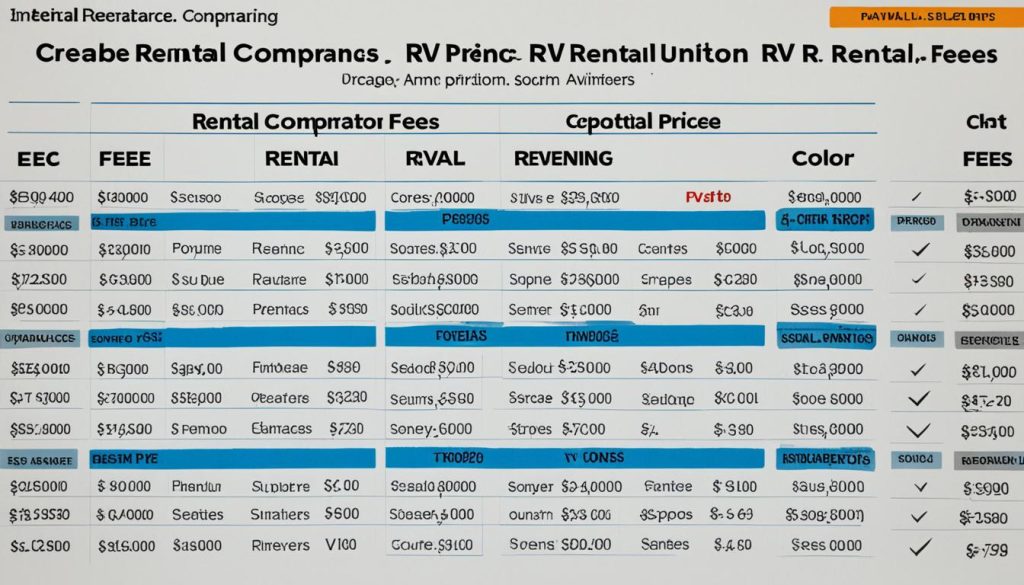
Comparing Rental Rates Across Major Platforms
Major RV rental platforms like RVshare present customers with a variety of options and pricing structures. Some platforms may tantalize with lower upfront costs, only for renters to later discover additional fees for necessities such as cleaning, fuel, or the use of onboard generators. Renters may find themselves trailing their budget if these costs aren’t accounted for.
Minimum Rental Periods and Their Impact on Pricing
Many renters may not realize that the duration of their rental can affect the daily rate. Shorter rentals can often come with a premium, while extended trips might benefit from lower per-day costs. By understanding the pricing tiers set by different rental periods, vacationers are in a better position to economize and evade the sting of unexpected expenses.
Whether planning a cross-country odyssey or a weekend escape, potential renters should perform due diligence to demystify the RV rental prices and avoid the hidden costs of renting an RV. In doing so, they ensure their budget aligns with their thirst for adventure and the road ahead is as clear as their itinerary.
Comprehensive RV Rental Cost Breakdown
When it comes to Budgeting for RV rental, understanding the detailed RV rental cost breakdown is essential to avoid unexpected expenses. The base rate often represents just the beginning of your expense list, as several additional fees may apply, depending on how you plan to use and where you intend to go with your rental RV.
Before signing any rental agreement, it is crucial to consider the full spectrum of potential costs you might face. Here are some of the key elements that you should take into account, from mandatory expenses to optional add-ons that can enhance your experience on the open road.
- Base Rate
- Mileage Costs
- Generator Usage
- Equipment Rentals (e.g., kitchen kits, linen, outdoor furniture)
- Propane Use
- Service Fees (including tank dumping and vehicle preparation)
- Insurance Coverage Levels
These cost components reflect essential aspects of renting an RV and can greatly influence your total rental expenditure. To illustrate these costs more clearly, a comprehensive table below outlines typical fees associated with RV rentals:
| Cost Component | Description | Estimated Fees |
|---|---|---|
| Base Rate | Daily/weekly rental cost | $100 – $300+ per night |
| Mileage | Charge per mile after allowance | $0.25 – $0.75 per mile |
| Generator | Hourly usage fee | $3 – $5 per hour |
| Equipment Rentals | Kitchen kits, linen sets, etc. | $50 – $100+ per trip |
| Propane | Fuel for heating/cooking | $25 – $50 per refill |
| Service Fees | Tank dumping, prep fees | $50 – $150+ per service |
| Insurance | Optional coverage levels | $15 – $30+ per day |
Keep in mind these figures can fluctuate based on the rental company, location, season, and RV type. Additionally, renters should always inquire about any special offers or packages that can bundle some of these costs for savings. Therefore, thorough research and questions directed to your rental provider will help provide a clearer financial picture, ensuring that your adventure is not only unforgettable but also stays within budget.
Each additional fee contributes to the final cost of your rental, and by reviewing them in advance, you can set aside the appropriate funds. This preparation will help secure a financially viable trip where the focus remains on the experience rather than unexpected costs.
Hidden Costs of Renting an RV
While the anticipation of a road trip in a rented RV can be exhilarating, it’s essential to acknowledge the unexpected expenses that can sneak up on unwary travelers, which can considerably affect one’s budget. Being prepared for these unforeseen expenses in RV rental is the key to a stress-free adventure.
Fuel Consumption and Budgeting for Gas
Fuel costs might be the first unexpected expense RV renters face, with gas mileage considerably lower than that of the average car. Depending on the size and type of the RV, gas budgets can quickly balloon. Practical budgeting for gas requires understanding your RV’s gas mileage and the anticipated distance of your travels.
Mileage Charges Beyond the Base Rate
Many rentals include a set number of miles in the base rate, and it’s not uncommon to incur significant charges if you exceed these limits. Companies like Cruise America typically charge an extra fee per additional mile, so tracking your mileage is crucial to avoid unexpected RV rental expenses.
Additional Generator and Equipment Usage Fees
The use of an onboard generator is often not included in the rental price. Expect additional charges based on how many hours you use it. And don’t forget about the potential cost of renting ancillary equipment such as kitchen and bedding kits, which can quickly add up.

By diligently reviewing and preparing for these potential costs, you can ensure your journey remains within your financial means and is as enjoyable as possible, free from the shadow of unforeseen expenses in RV rental.
Exploring Rental Locations: Where to Score the Best Deals
Embarking on a journey in a rental RV presents a unique set of considerations, particularly when it comes to cost-effectiveness. With a strategic approach to renting in different locations, travelers can unlock significant savings and get the most value out of their adventure. It is crucial to navigate the intricate landscape of RV rental cost breakdown and heed tips for avoiding hidden RV rental costs to ensure a journey that’s both enjoyable and economical.
Price Variations by Region
One primary factor influencing RV rental deals is the geographical region. Some cities are known for their competitive rental markets, offering rates that can be quite tempting. For instance, San Diego’s pleasant climate and year-round tourist appeal mean that rental companies need to provide attractive prices to stand out. Similarly, Phoenix’s sprawling landscapes and road-trip culture create opportunities for vacationers to capture deals that are below the national average, particularly for those seeking the luxuries of a Class A motorhome without the splurge.
Seasonal Fluctuations in Rental Costs
The time of year can have just as much impact on rental costs as the location. Renters can take advantage of seasonal dips in demand to secure lower rates. For many regions, winter brings about a reduction in RV travel, leading rental companies to offer discounts to encourage tourism. Conversely, summer sees a spike in demand, especially for destinations known for outdoor beauty and favorable weather. A savvy renter can sidestep peak prices by planning a trip during the shoulder seasons when the demand is balanced.
Discount Opportunities in Key Locations
Moreover, specific locales may present unique opportunities for discounts. For example, making an RV rental booking in Portland during a lull in local tourism can lead to substantial savings—especially for Class B motorhomes popular among smaller travel parties or solo adventurers. Special promotional codes, long-term rental discounts, and loyalty rewards are just a few of the methods companies use to attract customers. Thoroughly researching and tactfully timing bookings can yield significant discounts, allowing a broader exploration of hidden gems and iconic roadways alike.
Ultimately, the informed renter will treat the preparation phase as part of the journey itself—a chance to scour various locations for the best RV rental prices, avoiding hidden costs, and aligning travel dates with periods that favor their budget. With a little patience and strategy, the road less traveled could mean more money in your pocket for experiences along the way.
Insurance and Damage Deposits: The Hidden Safety Net Costs
When it comes to hitting the open road in a rented RV, savvy travelers know that the upfront rental cost is only part of the financial picture. RV rental insurance costs and damage deposits are critical components that form the hidden safety net for both the renter and the rental service provider. Particularly, the RVshare Protection Plan is a noteworthy mention, offering comprehensive coverage and peace of mind.
Understanding the nuances of these protective measures can help renters avoid unexpected budget strains. The RVshare Protection Plan, a staple within RVshare’s platform, integrates multiple layers of coverage into the rental experience, addressing a range of potential incidents and liabilities. Here’s a brief look at the structure of such plans:
| Coverage Type | Details | Cost Included in |
|---|---|---|
| Comprehensive & Collision | Up to $300,000 | RVshare Protection Plan |
| Roadside Assistance | 24/7 Support | RVshare Protection Plan |
Equally important for renters to consider is the damage deposit – a refundable sum that acts as a security for the rental provider. Generally speaking, these deposits can range from $500 to $1,000. Renters who return the vehicle in the condition they found it can expect the full refund of this deposit, making it a conditional part of their travel budget.
By including the RV rental insurance costs and damage deposit in their initial budget, travelers can embark on their RV adventures with an added layer of financial security and significantly fewer worries.
Lastly, while invisible to the eye but critical for anyone planning an RV vacation, one should take stock of all the insurance options and mandatory deposits. It’s these preparatory steps that transform a good trip into a great one, ensuring all surprises on the road are the pleasant kind.
Post-Rental Fees: What to Expect After the Trip
Embarking on an adventure in a rented RV can be a thrilling experience, but the journey doesn’t end the moment you park for the final time. Post-rental fees are an integral part of the rental agreement that should be reviewed and understood before you set out. These fees can range from cleaning and maintenance to late returns and additional mileage costs. Notably, companies like RVshare may impose post-trip fees that should be clearly communicated to avoid any post-adventure surprises. Let’s delve into what you might expect once your memorable journey concludes.
Cleaning and Maintenance Surcharge
After miles of enjoyment, returning your home-on-wheels in a clean state is not just courteous; it’s often a financial necessity to avoid RV rental additional fees. Depending on the rental agreement, you may encounter cleaning fees, especially if the RV is returned in a condition that requires more than the usual tidying up. Companies like RVshare may charge based on the owner’s discretion for vehicles that come back exceptionally dirty, affecting your security deposit and final charges.
Penalties for Late Returns and Refueling
Time management is yet another aspect to consider. A late return can disrupt schedules and result in penalty fees, adding a sour note to the end of a trip. Moreover, failing to refuel the RV to its initial level can incur refueling charges, which often include a premium on top of the normal gas price. These unexpected RVshare post-trip fees can be hefty, so ensuring a timely and well-planned return is crucial for keeping your budget intact.
Unexpected Charges and How to Dispute Them
Sometimes, costs can incur that you didn’t predict, and it’s important to know how to address these charges. Reviewing the final bill for any discrepancies and having a clear communication channel with the RV owner can smooth the process of disputing any erroneous fees. Remember, with detailed documentation and respectful negotiation, most issues can be resolved amicably. Identifying and understanding these contingencies in the rental agreement beforehand can save a lot of trouble after your RV experience concludes.
| Type of Fee | Description | Renter Tips |
|---|---|---|
| Cleaning Surcharge | Fees imposed for excessive dirtiness or failure to clean before return. | Take photos upon return and clean as per agreement. |
| Late Return Penalty | Charges applied for returning the RV later than the agreed time. | Plan your route and timetable diligently. |
| Refueling Charge | Cost for not refilling the RV’s fuel to the agreed level. | Refuel close to the return location to match initial levels. |
| Unexpected Charges | Any other fees not initially disclosed or agreed upon. | Dispute with clear evidence and communication. |
Tips for Avoiding Hidden RV Rental Costs Through Planning
Embarking on an RV journey can be an exciting adventure, but it can also bring unexpected financial hurdles if you’re not vigilant. One of the most efficient Tips for avoiding hidden RV rental costs starts with meticulous preparations. For example, understanding the intricacies of your rental agreement could save you from unforeseen charges down the road.
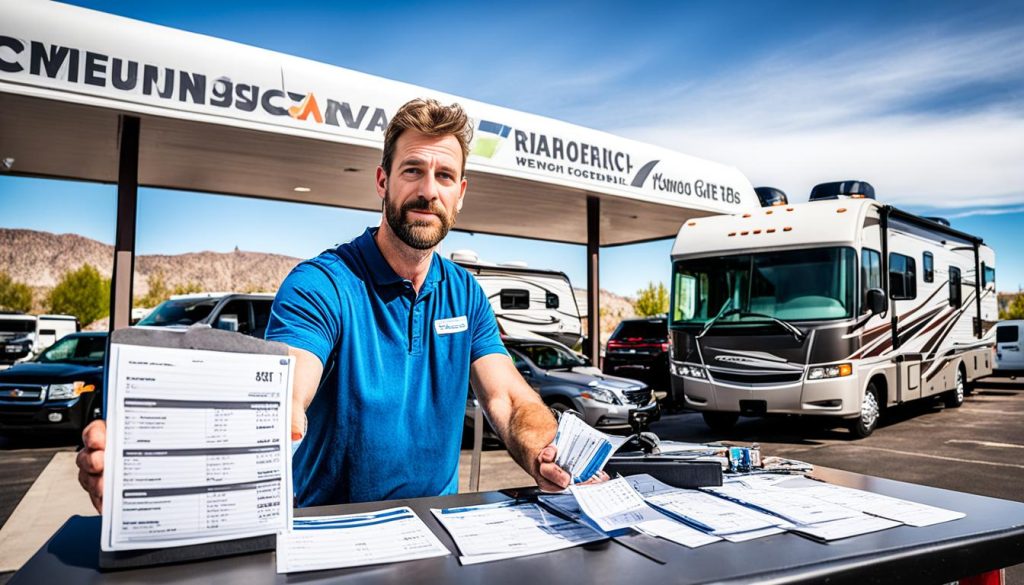
Before you sign any agreement, take the time to ask the rental company for comprehensive clarification of any RV booking hidden charges. It’s not enough to just skim through the terms and conditions—every single line is crucial. Examine what the rental price includes. Are there limits on mileage? Are there penalties for late returns? What’s the policy on generator usage? These are all questions that could directly affect your wallet.
Proactively managing all aspects of your RV rental is key to steering clear of hidden fees and ensuring your trip is as enjoyable and cost-effective as possible.
Clear communication with the owner or rental company is another safeguard against surprise expenses. Clarify the expected condition for the RV return to bypass steep cleaning and repair costs. It’s also wise to take photos or a video when picking up the RV to document its initial condition, helping you dispute any post-rental charges if necessary.
- Read the entire rental agreement closely
- Inquire about all potential additional fees (mileage, generator use, late returns)
- Review the insurance policy to understand coverage and deductible costs
- Determine any geographical restrictions that may incur extra charges
- Budget for fuel, campsite fees, and other operational costs
- Discuss the state of cleanliness and repair needed upon RV return
- Document the RV’s condition at the start of your rental period
By embracing these tips for avoiding hidden RV rental costs, your travels will not only be filled with breathtaking vistas and cozy campfires but also the peace of mind that comes with financial transparency and control.
Budgeting for RV Rental: Making Your Adventure Affordable
Setting out on a road trip in a rented RV epitomizes freedom and flexibility. However, to truly enjoy the open road without financial worries, savvy planning is paramount. Effective budgeting for RV rental is not just about monitoring the initial costs; it’s an inclusive approach that encompasses every conceivable expense, ensuring your adventure remains within your financial means. A meticulous RV rental cost breakdown will guide you to manage your funds efficiently and earmark resources for unexpected costs, letting you focus on the enjoyment of your journey.
Creating a Comprehensive Budget Checklist
To eschew the sting of hidden fees and to keep your bank account in check, draft a budget checklist that extends beyond the base rental rates. Precisely itemize each potential cost, such as insurance, taxes, fuel, campsite fees, and those must-have extras that enhance the travel experience. Factor in seemingly minute details like tolls and kitchen kits, as these can accumulate and impact your budget. Aligning your expected expenditures against this checklist will not only give you better control over your finances but will prevent surprises that could dampen your spirits as you traverse the country in your home away from home.
Identifying Ways to Save on Rental and Travel Expenses
Resourcefulness can be your ally in cutting down expenses. Thorough research and price comparisons across rental platforms, like RVshare or Cruise America, can unearth significant savings, especially if you’re timing-sensitive and able to take advantage of off-peak discounts. Geographical flexibility can also bode well for the budget-conscious traveler, as certain locations offer far better deals on RV rentals than others. A mindful approach to planning routes and overnight stays can yield reductions in fuel consumption and campsite costs, ensuring your budget stretches further along the roads less traveled.
Investing in Memberships and Rewards Programs for Long-Term Savings
Adventures on the road don’t end with a single trip. For those who hear the call of the road often, investing in memberships and rewards programs can lead to long-term savings. Organizations such as Harvest Hosts offer unique overnight camping experiences, often at reduced costs or for free, in exchange for membership fees. Likewise, leveraging rewards from credit cards used for bookings or loyalty programs from RV rental agencies can translate into future discounts and benefits. In the grand scheme of travel, such tactics can substantially lower the overall expenses of your RV rental experiences, making every journey as affordable as it is enjoyable.

